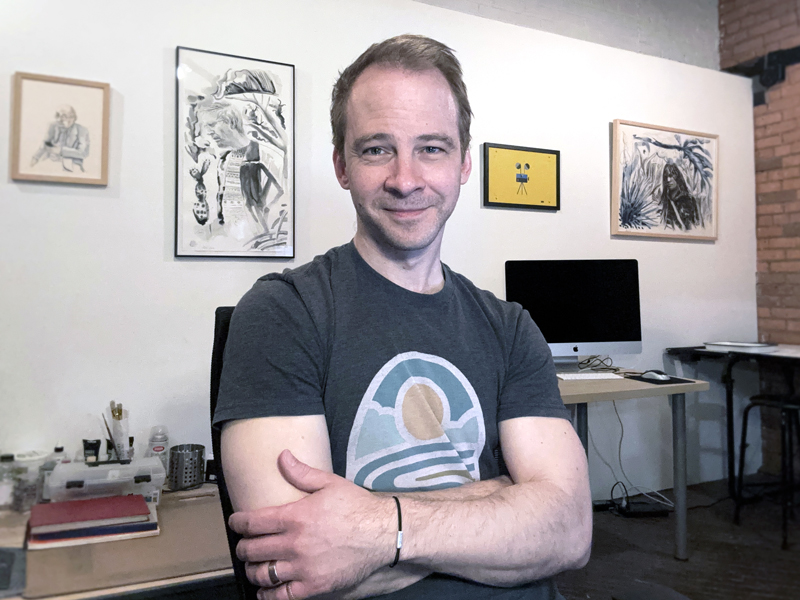
Q: Can you tell us a bit about your background and current artwork?
A: I actually grew up in Rochester NY and fell in love with the arts during my upbringing here. I was raised in Brighton but was able to take some classes and engage with professional artists in the city of Rochester which really opened up my world to drawing and painting at a young age.
I decided to pursue my artistic journey after high school and got my BFA from the Cleveland Institute of Art. I originally chose the school because of the marvelous painting major and studios it had. But during my 2nd year design class I fell in love with the work of William Kentridge and pivoted my direction into the school's digital arts major. There I explored animation, motion design, web design, film and video. I became enamored with seeing my drawings, paintings and designs come alive through story and motion. From here I decided to continue my artistic practice but with a focus on film and animation. I proceeded to move to California to get my MFA from Calarts in Experimental Animation.
After graduate school I moved to Brooklyn and have been an artist, motion designer, and animation director ever since. I predominantly work in the short form commercial world with brands, advocacy organizations and even music videos. In between client work I make my own art and short films when I can. After living in Brooklyn for 8 years with my wife Lauren, who is also an artist and designer, we decided to move back to Rochester in 2018 where we first met. We currently live in Brighton with our two daughters Mabel and Edith.
Q: What do you need to advance your career/take the next step with your artwork?
A: My biggest need is probably time and space to focus on my independent voice as an artist. This can be hard when you also need your art to financially sustain you as well. I’ve been a self-employed commercial director, animator and designer for over a decade and as the years go on I find that there is more and more to keep up with and less and less time to do it in. Similar to any industry I’m at the mercy of market trends, rapidly changing technology and sales ebbing and flowing.
I find myself at a sort of transition point in my career where I’m trying to take stock and see what I actually want to focus on with my limited time. What do I want to build and in what direction do I want to go. Do I want to steer my animation studio practice deeper into the commercial space or find a way to allow my artistic voice to guide it into a more versatile art practice that can exist through multiple forms of art making and design.
As I get older I realize there is only so much I can do myself. Because of this I’m increasingly interested in either finding individuals to help me on the production/ sales side of my studio practice or partnering with a larger team to work towards a common goal.
Q: Tell us about being a full-time artist! How do you achieve life/work/artwork balance?
A: As a parent I’m constantly balancing the reality of supporting my family, having quality time with them and allowing space for my professional and personal art practice to exist. These demands have made me realize that my time and how I spend it is really important. The time and energy I could put into my art a decade ago isn’t the same as it is now and I'm constantly trying to balance all the different spheres of my life. I often find sacrifices and justifications are constantly being navigated within that balance. Wants, needs, wishes, hopes, and patience are thus in constant flux.
Something I’ve been sensitive to lately is how to avoid feeling burned out when trying to balance it all. If I expect to have the energy I need to take worthwhile steps forward in my personal life and artistic practice I’ve found that it’s crucial to have my own sense of hope, inspiration and awe intact. Establishing and discovering the sources to these things is a lifelong pursuit that I've discovered is paramount to everything else. In this regard, taking care of my health and having the quiet space to breathe and reflect are some of the routine things I’ve found I can’t neglect.
Q: Who do you consider to be your greatest artistic mentor? What did they teach you?
A: I’ve honestly had so many mentors over the years. And many of the artistic lessons and encouragement I’ve received weren't necessarily from “artists” themselves. My parents supported my abilities from the beginning and never stopped. My 2nd grade teacher said I had a talent which validated me and kept me moving on my artistic path. Early teachers in Rochester like Loree Harpole and Steve Carpenter kept me hungry for art school and getting better. My undergraduate professors pivoted me into a medium of film and animation I never would have considered without them. My Graduate professors pushed me further into that medium and gave me a platform into an industry. My commercial reps and producers for over 10 years have given me the support and guidance to develop as an independent artist and director. And it would be an oversight for me not to acknowledge the constant guidance and inspiration I receive daily from my wife and children. Any relationship no matter how small has opened new doors for me on this life long journey.
But there is one memory which I still remember to this day every time I sit down to draw. I took a summer arts class when I was in elementary school. The class had a very young teacher who was probably a college student or fresh out of college. While we were sketching outdoors, he made a comment as I was focusing on rendering everything with line work. He said “Andrew, that's a great drawing. I notice you’re drawing everything with lines. Have you ever looked at your surroundings as solid shapes of varying values and gradations?” He then sat next to me and started to draw the scene with blocks and shapes from the side of his stick of charcoal. This young man whose name I will never remember, and who certainly doesn’t remember me, taught me how to see the world completely differently. For some reason I’ve never forgotten that moment. It just goes to show the lasting impact one can have on a young impressionable mind.
Q: How long have you been a RoCo member? Why did you join?
A: Shortly after moving back to Rochester in 2018 an old family friend of mine introduced me to RoCo. I was very excited about the organization because I wasn’t aware of it when I was growing up here. I quickly fell in love with what RoCo was doing for the city and its artistic community. I started going to the openings, First Fridays, 6x6, and The Members Exhibition. It immediately connected my wife and I to a larger artistic community that was reminiscent of but also more accessible than what we had in Brooklyn. It’s also given me opportunities to show and speak about my work on multiple occasions. I joined and never looked back!
Q: What is great about Rochester? What can we do better?
A: My wife and I moved back to Rochester because we both loved the city and had great memories growing up here. It’s a good size, more affordable than NYC or LA, has a lot of great history, and a rich artistic community in the visual arts, music, theater and film. It’s also a great place to raise kids and has lots of activities to do in and around the city.
I do think Rochester however, like most other cities, has a long history of segregation which we’re still navigating today. Breaking down barriers to equal access to education where everyone has a fair shot in life is a big focus not just in Rochester but our world at large. I know many kids didn’t have the same opportunities I had growing up and I like to think of Rochester as having a history of progressive thinking and fighting for the change it wants to see in the world. I hope it continues to be a city we feel pride in as we move forward through these turbulent times.
Q: and similarly: What is a major challenge artists face in our community? How do you think we can overcome it?
A: For me I’d love to see Rochester work towards building an art market or viable environment where people could possibly find ways to make a real living as an artist. The notion that one must move to the major markets in the most expensive cities in the world to “make it as an artist” is a long standing cliche that, while true in some regards, feels outdated and no longer the case in our rapidly changing technological landscape. I’d love to see the community, businesses and organizations of Rochester figure out a way to make itself known on the world stage and find ways to create a hub that builds new opportunities and markets that could be a viable alternative to having to live in places like NYC or LA. I’ve lived in both those cities. I love both those cities. But I also love Rochester and feel it has an untapped potential in the strength of its businesses, universities, and collective artistic community.
Q: Something more light-hearted: -What are you currently streaming/watching/bingeing?
A: On a relevant note I’m watching “The Studio” on Apple TV to lighten the mood when I need it. Very poignant in regards to balancing artistic ideals with an industry and market that doesn’t always care about them.
View Andrew Zimbleman's exhibition The Subway Series
Learn more about Andrew: @studioadz and studioadz.com

